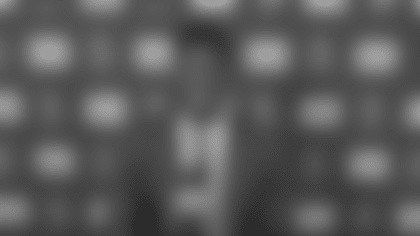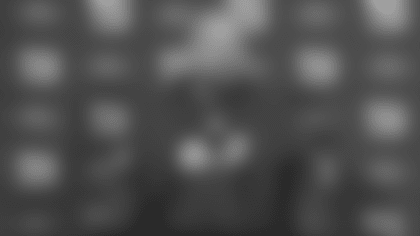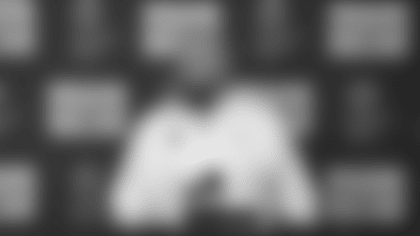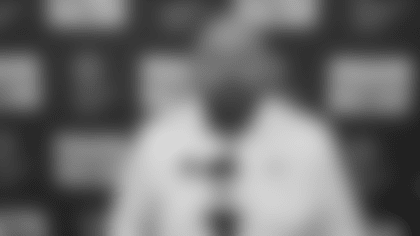Defensive Coordinator Wink Martindale
Martindale: Do you guy's clocks get thrown off with this stuff? Or is it just coaches and players? Like it's usually Thursday but now it's Wednesday or is that just me being old. I hope everybody had a good Thanksgiving. 7-4 heading into December when all the fun begins, and we've got everything in front of us. We're looking forward to the challenge of playing Washington and it's going to be a great challenge here. Very talented at receiver and running back. Their quarterback, he's got the hot hand right now and he's playing really well at a high level. So, it's going to be a great challenge. With that, I'll open it up to questions.
Q: We haven't spoken to you since (cornerback) Adoree' (Jackson) got hurt. How much of a impact does that have on you and what you guys have tried to do?
A: I think it will be one of those things at the end of the season we'll look at the total impact of it. The biggest impact is on the person himself because I know how hard he's worked and how well he's played. That's the toughest thing to see a thing like that happen. We've been dealing with injuries all year and we've just got to put the next guy in there, but I miss the person that's out there on the field. He's out there right now during walk-throughs, talking to the corners and still leading like a champ. I can't wait until we get him back and I have no idea when that will be.
Q: How much does it change what you can do when you don't have a cornerback that you can say, 'ok, I can put him on the other team's best receiver.' Then maybe move him around?
A: I think there's not a overall huge change because every week we try to do something different and we're going to look at the win probability of it, of what we do and what plan we go with. It's just the toughest thing is when you have somebody that you're working that week and then something happens to him during the game. That's the thing that affects you.
Q: Does it upset you that you lost him on a play that wasn't on defense?
A: We have great communication here in the building and we know where we're at and what we're building. I feel bad for the guy.
Q: We talk about sacks all the time and it's not all about sacks but when you get so many pressures and there's no sack to go along with that, would you like to see a sack mixed in there once in a while? Do you think there's been any frustration getting so many pressures without the sacks?
A: I give (Dallas quarterback) Dak (Prescott) all the respect in the world. He stood in there and took some hits. To me, sacks are a lot like turnovers, they'll come in bunches when they do. When you look at the quarterback hits, then look at the completion percentage of the quarterbacks in this league and I think we're third overall in both hits and quarterback completions against us. Low rate, saying a good rate for us.
Q: Where does the pressure percentage come in for you, in terms of stats that you look at? Does that come in higher than the sack percentage?
A: Yeah, I think that the sacks will come. When are the sacks occurring? When they have to hold the ball to make a play. I alluded to (outside linebacker) Kayvon (Thibodeaux), who I thought played his best game to date against Dallas. When we were playing Baltimore, that sack. (Safety Jason) Pinnock, to end the game basically. When they have to hold the ball because that's the other thing you look at is how fast the quarterback releases the ball against your defense. I think we're third in that as well. I think they're third in all three categories, if I remember correctly.
Q: When everyone plays Washington it's a lot of talk about their defensive front and their four first round picks, that's not your concern obviously but you guys have three, there's a defensive front guy with Kayvon, you have three first round picks. Should your defensive front take a backseat to anybody in your mind?
A: I love our front. I love the front that we have, and I haven't studied other people, that will be in the offseason when we do that. I know they play really well there in Washington, too, their front. So, I'm just looking at what's best for us to win that week. I'm not thinking about backseat, front seat or anything else.
Q: Do you think your defensive front can take control of the game?
A: Yeah, I hope so. I mean, that's the plan. Then they snap the ball, and we'll see what happens.
Q: Do you feel like you're going to have (outside linebacker) Azeez (Ojulari) back this week?
A: I think (head coach Brian Daboll) Dabs is going to answer that one, if we'll have him back or not. I hope that we do.
Q: How much have you missed him?
A: A lot. It sounds like a Hallmark card, doesn't it? (Laughs) I've missed you a lot.
Q: You've mentioned that you've never seen a roster move around this much before. How have you handled that as a coach?
A: I think it becomes the norm after a while. It's just like I asked you guys when we came in, 'does this throw you off being here Wednesday instead of Thursday?' because it does me. The way it's been this season, it's just sort of become the norm that 'ok, here's who we have, let's plan it this way, let's do it this way.' It's really become the norm, which that's not a good thing to say, I understand that, but that's where we're at.
Q: What you'd think of (cornerback) Rodarius (Williams)?
A: I thought he played well, I did. He really hasn't played in two years and to come in there and play the way he did, I was really pleased with him.
Q: Can you speak to what you've seen from Jason Pinnock and his contributions?
A: I think that he's done a great job. Still has a lot of things to learn as far as being an every-down player, an every-down safety, but I think he's done a great job since he's stepped in. We have other guys, too, that we'll mix into those roles.
Q: Dabs has spent most of his career on the offensive side of the ball, so I'm just curious behind the scenes, how much input does he have during the week, during the games, with what you're doing?
A: We meet with him every week, every day, every week. What's great about it is he gives us the offensive side of it, 'here's what I think they're seeing' and that's been great. That's been helpful to me and the rest of the defensive staff.
Q: What do you think of your run defense and how does your run defense stop (running back Brian) Robinson and Washington?
A: We're just going to have to get 11 hats to the football, and right now statistically, our run defense isn't very good. We need to continue to work on fundamentals and technique and getting everybody to the football. When you start putting in all the other runs, the wide receiver sweeps and all the other plays off of it, I think run averages are up across the league, but I think we need to get better at it.
Q: What do you see from Robinson? It seems like it's a pretty amazing story everything that happened to him, for him to be back. It seems like the last couple of weeks he really started to hit his stride.
A: Yeah, he's a load. He ran over that corner from Atlanta. He seeks out contact, so he's going to be another one of those tough backs that we're going to have to get a lot of people to the ball to get him down.
Q: You've been pretty open since you've got here about how you guys are going to dictate to the opponent. You're not going to sit back and let the opponent dictate for you. Do you feel like you guys are in that position, or do you have to do more to dictate defensively early on in games?
A: Right now, we've done a nice job coming out of the gate usually as a defense. We've just got to make sure that we can extend that period of time of playing. Starting fast in the second half, I think, is a focal point this week that we need to have. Do I still say that we dictate to the offense? Yes. I think we dictate to the offense, but you can do it in different ways like, I've said before, as well.
Q: Can you dictate when you have all the injuries?
A: Yeah. We're not going to use that. If you want to rush three and watch (quarterback Taylor) Heinicke sit back there and pick people apart like he does when you're rushing just three guys, that'll be a boring game to watch.
Q: Did you challenge Kayvon at all before the last game? Do you coach him that way ever?
A: Yeah, I think challenge might be a strong word. I just have confidence in him. I just know that he's on the rise, he's on the come. He's much better than what I originally expected as far as all the other little stuff. I'm not saying that just him personally, I'm saying rookies, he's much further ahead than most of the rookies in his class as far as how he prepares for the game and his knowledge of the game already and of the defense itself.
Offensive Coordinator Mike Kafka
Q: What happened with the 10 men on that fourth down? What happened?
A: Yeah, we addressed that internally. Talked about it with the players and staff. That's one of those things we've just got to overcommunicate and get that thing executed.
Q: I assume you didn't notice at the time either?
A: Yeah, I mean obviously when we got on the ball, we noticed it.
Q: At that point, it's just too late to relay a timeout?
A: Yeah.
Q: Why would that be too late to call a timeout?
A: The timeouts would be something that I wouldn't call. It would be at the discretion of (head coach Brian Daboll) Dabs.
Q: How consciouse are you going into a game, making the gameplan or when the game is rolling of (running back) Saquon's (Barkley) workload?
A: Yeah, very conscience of it. Making sure that he's in the right spots and calling good stuff for him.
Q: The last two games, the run game has been less than 100 yards. When you look back, what's been missing and what do you got to get?
A: I think it's a combination of trusting it, all of us – players and coaches trusting it – executing it, getting the right fundamentals and techniques. That'll just come with the work and that's why we're coming to practice today with a good mentality, a good attitude and I think we can clean up a lot of those things that we've been missing the last couple of weeks.
Q: What are those things that have been missing?
A: Just like I said, the fundamentals, techniques, the execution part of it. Each week we go through and evaluate it and talk about all the details and see how we can continue to simplify it for the players and give them stuff they can go and play fast with and execute.
Q: How difficult or challenging is it to start a game running the ball? Even when you've run well, often it's not been good early, especially for a team like this where people are expecting you to run the ball. Do you have to set it up? How difficult is it to start a game and say we're going to run?
A: I think you have to have flexibility. I don't know if you can go into one game saying one way or the other, you have to be able to adjust. You come in with your initial game plan, your thoughts on how they're going to play you and things that they've presented on tape. You go back and you trust what they put on tape and trust that your study and your prep is correct. Then you get into the game and the flow of the game and you got to adjust, whether it's by scheme, personnel, formation, the plays. Those are things that we talk about in and out of series.
Q: Do you think (tackle) Evan Neal can help a lot in the run game this week?
A: Yeah, yesterday was a good day. Today, we'll continue to evaluate it. Obviously, Evan is a good player and he adds some juice to the o-line room in what he brings. I'm excited for him and I think today he's taking it day by day and continue to work on all those fundamental things that we talked about earlier.
Q: Where do you stand at this point at left guard? I know you have a bunch of guys as options now.
A: I think Dabs hit on it yesterday. We're rotating some of those guys to get them. Some of it is by, it's this time of the season where guys are dinged up, we're trying to make sure that we keep guys fresh but then also putting guys in those spots to get a look at them.
Q: There was a time in the league when you'd say, "Got to get the run game going," you'd never say "you got to get the quarterback part of the run game going." Do you feel like that's a part of the game that you need to get going more? Everybody looks at Saquon, but do you feel like you guys got to get (quarterback Daniel Jones) more involved in that?
A: Sure. Sure, it helps. It's part of every game plan. We've had it since the beginning of the season is being multiple with the run schemes, being able to use the backs, being able to use DJ out in space on a couple of different things. It's something we look at every single week.
Q: Did you think Daniel (Jones) had opportunities to run in Dallas or he did not? Would you like to see him run more than three times?
A: I'd have to go back and look at every single opportunity again and from that respect. I thought he did a good job of when it was there, stepping up trying to get what he can. In the run game part of it, I think he was accurate with his reads. Sometimes, there's parts of it where it's a zone read where you're reading a certain defender, whether it's first level or second level, and so we got to stay disciplined on that. From what I remember, I thought he did a pretty good job of negotiating that.
Q: Why do you think Daniel's (Jones) rushing numbers as a total just by volume have decreased as the season has gone on?
A: I think defenses have done a good job of defending that. When we look at the schemes of how we get DJ on the perimeter, some teams might play the defensive end just a little bit different so that they take away the QB run if that's being effective. We got to be flexible and create complements off of those things. That's where we're at right now within the season is what are we doing really well, how can we build complements off those things? And then we have to go and execute it.
Q: How much flexibility does (tight end Daniel) Bellinger add if you get him back this week?
A: Daniel (Bellinger) has done a good job. He had a good day yesterday; it was good to see him out there and bouncing around in the pads. Any time you can add another guy to the offense gives you some flexibility from a personnel standpoint and then gives you some flexibility from an execution standpoint.
Q: How does it affect your game planning that Washington just played a team that has a similar offensive skillset to you guys?
A: You look at that and you study it and see if you can find any kind of advantage from an offensive standpoint with their personnel, with their structure, with how they're playing certain run and pass concepts. We're looking at that and evaluate all that.
Q: How did they play (Atlanta quarterback Marcus) Mariota in your mind? He's a running QB.
A: Well, I don't know if I want to divulge exactly how they did it in relation to how we would do it. I thought they had a good gameplan. Obviously, they won the game. I'm sure they felt that they executed it. I think there are some elements there that we can take advantage of.
Q: Going back to the spring when you guys started putting this offense together, you envisioned a role for (Daniel) Bellinger and then you saw him grow into that role. Maybe not so much what he can give you on Sunday, but are there things that you can identify that with him out that you lost in this offense that you've been trying to find that now if he's coming back, you can actually get those things back in your attack?
A: I'd say this, I think the guys that we had in, they stepped up. We had a great 'next man up' mentality, really throughout all these injuries that we've had. Guys have stepped in, they've played huge roles for us as an offense. They've stepped in and done everything they can. They've played their butt off. Really, when I'm looking at that, obviously when Bellinger comes in – he does a good job and he goes and does his job. That's what we're going to ask these guys to do, whether it's the run game, whether it's the pass game. We're asking our guys to go out there, run the fundamentals and techniques that we ask them and play as hard as they can. Our guys are doing that. That's one thing you can build on.
Q: You mentioned opposing defenses know that Daniel (Jones) has this option and the defensive ends are playing him a little differently. You mentioned you need more complements to that. Is it disappointing that you guys have not had a counter to that where they're taking that away and you go to something else right away and find success there?
A: I think we're working through that. That's each week. Each week, you got to go through that process and continue to build off of what you did the week before or weeks before. That's where we're at today. That's where we're at today in practice. We're working on our situational stuff - third down, red zone – and that's part of our process.
Q: Teams should be able to make the defense pay, right? If they're going to sell out in one direction.
A: I think you have to have the flexibility to have complements off of your concepts, your run and pass stuff.
Q: Will you meet with Odell Beckham Jr. tomorrow as part of his free agent visit?
A: I know (general manager) Joe (Schoen) and Dabs have a plan on how they want to work it. I'll wait for them on how exactly they want to do that and we're all on board on however Joe and Dabs want to work that.
Special Teams Coordinator Thomas McGaughey
Q: Was that (punter) Jamie's (Gillan) best game, do you think?
A: It was pretty good. It was pretty good. It's trending more in the right direction as far as hang and distance and what we want to accomplish, but we got to help him out. The gunners got to help him out, make some plays for him down there. He did a really nice job; he's trending in the right direction for sure.
Q: How? What are you looking for (from) your gunners in those spots?
A: Make the play.
Q: What do you want them to do differently?
A: Catch the ball. Don't drop it. There's some little, small nuances within our scheme, what we want to do, working back towards the goal line, the punt side gunner and being able to have a better angle coming back to the ball. And just doing little stuff like that: Just making sure we're doing our job correctly. And to put themselves in a better position so make sure they can make the plays.
Q: Is that demoralizing for a punter, for the whole unit, when everything is executed and by six inches, the ball crosses there (the goal line), and now they're at the 20 (yard line)?
A: It's not a fun feeling. I don't know if I'd say demoralizing, but it's not a place you want to be. It frustrates you, but we got to make sure we do a better job of that and just taking advantage of those opportunities when we get them.
Q: When he has a punt, let's say from the 40-yard line, trying to get it in close, is there a spot in which it should bounce like the 5 (yard line) or something?
A: Yeah, you want to give ourselves a chance. Ideally, if the ball hits around the four or five-yard line, that's not a bad thing. But again, you got to (remember) the fundamentals of the game: catch the ball, see it all the way into your hands. And he has to do his job by giving the coverage team an opportunity to down it, so you don't want the ball to hit at the one (yard line). If it does, you want it to bounce backwards. But if it hits and dives into the end zone, it just makes it difficult. And conversely, if it hits at the five (yard line), and you're there to get it, you got to catch the ball. It's not rocket science. It's pretty simple.
Q: Does having him (Jamie Gillan) help at all this week when you're going against a lefty punter (Commanders Tress Way)?
A: Absolutely. They've been seeing it ever since training camp, and Jamie and Tress are very similar in how they hit the ball. They like to hit the same style of punt. So, it shouldn't be anything new because they see the same lefty spin with the same kind of power every day.
Q: What makes Tress so effective?
A: He is a ball striker. He's one of those guys where he's so effective hitting his directional ball out to his left, and then he can hit that pull spiral, and it's going the complete opposite direction with hardly any hangtime, and it just goes. It just goes forever. And when his ball hits the ground, it just rolls. So, when he's in the 30-yard backed up, 60-yard backed up, that ball could easily be inside the 10 (yard line or), inside the 5-yard line quickly.
Q: I'm curious why you think punting the ball, angling it out of bounds, has become so out of style. Until recently, guys were really good at it. What is it now that makes, not just you, but other people around the league not really want to do it.
A: It's not that. That's a hard skill. That is a really, really hard skill. I guarantee if you poll every special teams coach and if you could limit their ability to return the ball and punt out of bounds, they'd want to do it. But it's just hard. Because that's what we want to do: We want to be able to punt the ball out of bounds. But it's not an easy skill to do. The last guy that was here that was really good at it was (former punter) Jeff Feagles. You got to realize that by the time you all saw Jeff Feagles, he was in year 17, 18, 19, 20. And he had been doing it his whole career. It's not an easy skill, but you see a lot of power punters. These guys are bigger, stronger and faster than Jeff was; and Jeff will be the first one to tell you. These are some big, strong guys. You look at Jamie – Jamie's a big, strong human being. A lot of people like to punt for power now, and they just surround their team with speed. And now you can flip the field and really affect field position. So, it's kind of a different game than it was in the '90s and early 2000s than it is now.
Q: You have a long history with a certain free agent wide receiver (Odell Beckham, Jr.) who's going to visit here tomorrow. I'm just curious: Has anyone asked you what Odell is like? And what was it like coaching him?
A: No, nobody's asked me anything. If they want my opinion, they give it to me. (Laughs) I'm just kidding. It was great coaching Odell. I had him three years at LSU (Louisiana State University). He was obviously a dynamic player there from his freshman year all the way up until he left. It was fun watching him grow as a young man, coming in as a 17-year-old freshman and leaving and becoming a first-round draft pick and then watching him his first few years in the league. It was fun. He was fun to coach, and (he is a) super, super talented guy.
Q: Pretty good punt returner, too?
A: Not too bad. He wasn't too bad. (I) have some good, fond memories of Odell versus Ole Miss (The University of Mississippi) in a shootout, returning a punt for about 60, 70 yards for a touchdown. It was fun – special time.
Q: I think in 2019, wasn't (Commanders kicker) Joey Slye here for a coffee break? What has changed in his game?
A: Joey has done a really good job of just bringing his game along, maturing. The first time he was here, he was here for a hot second. And we gave him some things to go home and work on, and when he came back the next time, you could tell he had worked on them. Joey's leg is super, super live. He has a very, very strong leg. And he's very smooth, very methodical. And he doesn't swing outside of his body. He doesn't overswing. He's very, very compact. And if you see Joey, he's a big, strong dude. He's put together. He has done a really nice job of developing as a young kicker in this league.
Q: Does (wide receiver Kalil) Pimpleton have any chance of returning kicks in game action, or do you think he's more of a developmental player?
A: They've all got chances. Every guy on our roster from the top down, bottom up has an opportunity as far as the guys that are working back there, returning kicks. And even the guys that are just teams guys, our whole roster's live. At any point in time, those guys can be up and be playing. Look at (defensive back) Trenton Thompson last week – day before the game, boom. He's up, and he's playing. So, all these guys got to be ready for the opportunity, and we talk about it all the time in this room. You got to stay ready because it might be literally the night before the game to where you get a tap on the shoulder, and you've got to be ready to go.
Q: You've obviously been in this league a long time, and you've watched the trends week-to-week, year-to-year. With the return game – both punt and kickoff – you hear people talk about how it's changed through the years. But has your approach changed? Do you identify certain areas and say, 'You know what? Maybe we pull back a little bit on expectations here or on kickoff. And we need to get more out of punt because of the lack of return in another area and field position and everything else,'? How do you approach that week-to-week?
A: The expectation level never changes. We always want to perform at a high level. Now, the amount of time you spend on it, based upon who you're going against, is always different. If you know you're playing against a team that's going to hang the ball up, you've got to spend more time doing it that week. But if you know you're playing a team that they've had 45 kickoffs and 42 of them have been touchbacks, you know you're probably not going to get a whole lot of opportunity. So, it's a totally different game than it was in the '90s and early 2000s. It's a totally different game that way; the reps aren't there like they used to be.
Q: So, are you just protecting in that situation if you identify a week that you're not going to get kickoffs in this situation, just don't make a mistake? It's almost like the mistakes are magnified if you do make it a situation like that?
A: I think more than anything, you have to stay status quo as far as how you approach it. But just knowing going into the game that you can't chase plays because if you do, that's where you make mistakes. Just knowing that 'Okay, going into this game, we're probably not going to get a lot of opportunities,' especially if we're playing a team indoors and that team doesn't like to cover kickoffs. You just know going in, you're probably not going to get a whole bunch of them. So, instead of spending 30 minutes talking about their kickoff coverage team, I might spend 15 (minutes).
Defensive Lineman Dexter Lawrence
Q: What do you see from (Washington Quarterback Taylor Heinicke) him on film and do you feel like he's a guy you can rattle?
A: Well, he's a play maker and that's what he shows on film. You've got to respect him for his come up. He plays hard, he plays with his swagger, and he's got the team behind him, so we've got to go out there and affect him and stop the running game.
Q: When you can see that the other team has a guy that they believe in now, he's kind of got a little thing going. What's the key to stopping that belief? Getting on them early or something like that?
A: Winning. Just winning and doing what we can to slow him down, slow the running backs down, and be efficient.
Q: Has there been any frustration in recent weeks? You guys are putting a ton of pressure on guys but not getting the sacks. I know sacks come in bunches they say but it just seems like you're always around them.
A: That's just as effective as getting a sack. Last game, a couple hits turned into picks. As long as we're staying around him, making him uncomfortable, we're doing what we can. It's hard to get a sack, you know what I mean. Everything has to be on point. Proud of the guys how we continue to rush hard, continue to fight every play, and just keep going.
Q: Does it get frustrating sometimes when they are so many pressures and it doesn't end with (a sack)?
A: I mean, I want to win. I don't care about my numbers, I don't care about stats, the only stat I care about is our record. If I get 20 pressures, no sacks and we win that's fine. Sacks are sacks. You can get off the ball with no o-line and he can still throw the ball before you get there, so it's like everything has to go right. But upfront we pride ourselves on whooping the guy in front of us and affecting the quarterback.














